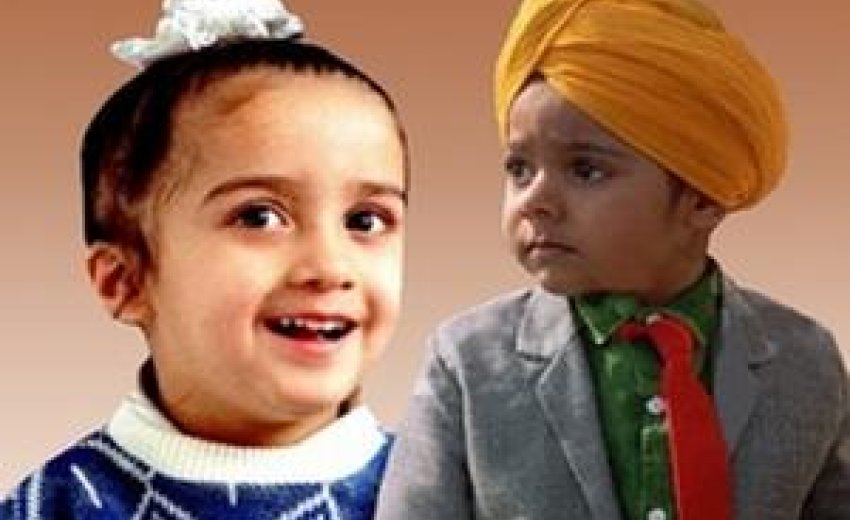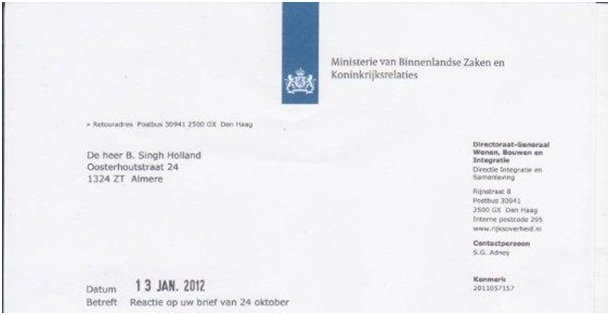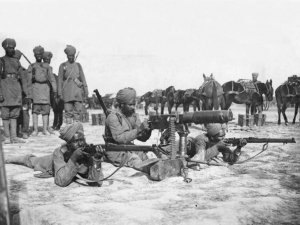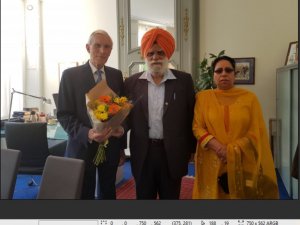[In our article dated Feb 14, 2010 it was mentioned inter alia ~ ED]
Jalandhar, February 14 - Sikhs settled in some of the European countries especially Holland, Belgium and Italy are now facing a new problem with regard to the naming of their children.
A Holland-based Sikh, Bhupinder Singh, who has authored books on the contribution of the Sikh soldiers in World Wars I and II in Europe, says the Holland Government had passed a law a few years ago. The law makes it mandatory for the child, taking birth out of wedlock of a boy or girl of Dutch nationality married in a second country, to bear the name of Dutch-nationality spouse. Sikhs, who are Dutch nationals, have been affected most by the new law. ..........more
[Pursuant to the relentless efforts of Sardar. Bupinder Singh Holland, Minister of Immigration, Integration and Asylum / The Netherlands, Mr. G.B.M. Leers, responded (English translation) positively as below in his letter dated 13 Jan 2012 ~ ED]
Dear mr. Singh Holland,
My sincere thanks for your letter in pursuance of the reply you have received on September 23, 2011 from the former Secretary of State for Home affairs (minister van Binnenlandse Zaken en Koninkrijkrelaties), mr. J. Donner. From your reaction I understand that you are only partly satisfied with the answer that you have received. This I do regret. From a viewpoint of carefulness my reply to your letter has taken some more time to reach you. I offer you my apologies for this.
You think that the cited passage from the code of behavior for the police force (Gedragscode lifestyle neutraliteit) excludes Sikhs on the basis of their religion a priori and by definition from public office in the police force and the judiciary. In your opinion this contravenes section 1 of the general law on non-discrimination (Algemene wet gelijke behandeling - Awgb), namely the prohibition to discriminate directly on the ground of religious beliefs. With regard to this you indicate among other things that a turban is an integral part of his religion for a Sikh and that the personal integrity of a Sikh is injured if he has to give this up. Your request is to reconsider your arguments in this context seriously.
Regarding the possibility to register Sikh children in the municipal birth registers (Gemeentelijke basisadministratie - GBA) according to the Sikh traditions you have the impression that this option is not generally known in the municipalities. You ask me to once more emphatically inform the municipalities that the family names of Sikh children can be registered in accordance with Sikh traditions.
I am pleased to react to your letter in the following manner.
Wearing a turban in public functions
Freedom of religion and the prohibition of discrimination based among others on religion have been laid down in section 1, respectively section 6 of the Constitution and in various treaties on human rights. The Awgb goes further into the details.
The point of departure, as has also been explained in the letter of September 23d, is that the basic rights also apply to officials in public functions. In general officials are not prohibited from wearing a turban or other symbols of their religion.
According to the Awgb direct discrimination on the grounds of religion or personal convictions is prohibited when appointing an official or on termination of his engagement and indirect discrimination is only permitted when an objective justification exists. This is the case when proposed (restrictive) means are fitting and necessary to realize a legitimate aim, stipulations that include the requirements of proportionality and subsidiarity.
Even if the wearing of clothes and/or ornaments that possibly give expression to a religious conviction does not in principle stand in the way of a proper functioning of an official, there are however circumstances where this may be the case. There are for instance official functions in which an impersonal or uniform exercise of authority is of exceptional importance. This is especially the case for the judiciary and for functions in which the government manifests itself in society supported by the strong arm of the law, like the police.
With regard to the judiciary is applicable also the impartiality anchored in section 6 of the European treaty on human rights (Europees Verdrag voor de Rechten van de Mens - Evrm), which guarantees a fair process and which is explained in such a way that even a semblance of partiality ought to be avoided. In consequence in relation to the nature of a function there may be reasons with regard to safety, functionality or impersonal execution of authority that can lead to a pressing necessity to impose dress regulations . This has happened with regard to the police in the 'Gedragscode lifestyle neutraliteit'. With regard to the judiciary, I refer to the letter you have received earlier.
You seem to be of the opinion that in the setting of norms for the police force it can be said that this amounts to 'direct discrimination', for which no lawful exception exists. In my opinion this is a case of 'indirect discrimination', because a neutral functional demand is made, namely "the police officer shall assume in the interest of his authority, neutrality and personal safety during his actions in contact with the public an authoritative, neutral en safe attitude". This norm has indeed the consequence of affecting the adherents of certain religions, among them the Sikhs for whom, as you indicate, the wearing of the turban is an integral part of their religion. For this form of 'indirect discrimination' there exists an objective justification as explained before, based on the impersonal, neutral execution of police tasks. With regard to the proportionality it can be remarked that this norm only applies to police officers who come into contact with the public.
Registration of Sikh children in the GBA in accordance with Sikh traditions
In your letter you express surprise that registration in the GBA of the names of Sikh children in accordance with Sikh traditions is possible at present. In those cases in which foreign or Dutch birth certificates mention the names in accordance with Sikh traditions, it is possible to register the names of the child in the GBA in accordance with these Sikh traditions. Children whose names have been incorrectly taken over in the GBA from a birth certificate can without costs request the municipality of registration to correct, to add to or to remove particulars in the GBA, if these particulars are factually incorrect or incomplete. Municipalities already know about this procedure. With this I have answered your questions regarding the registration of names in accordance with the Sikh traditions in the GBA.
In addition I take the opportunity to inform you about those cases in which the names of a child have not been registered in a foreign or Dutch birth certificate in conformity with Sikh tradition. In these instances the changing of an authentic certificate like a 'geboorteakte' (birth certificate) is attended with costs.
I hope I have been able to somewhat remove your discontent, but I am aware that differences in opinion cannot always be removed by a letter. Future correspondence about the same subjects I do not propose to take notice of.
Yours sincerely
Signed/-
1See Nota Grondrechten in een pluriforme samenleving 2004 (Note on the Basic rights in a pluriform society), Kamerstukken II 2003/04, 29514 nr. 2, p. 15-16







